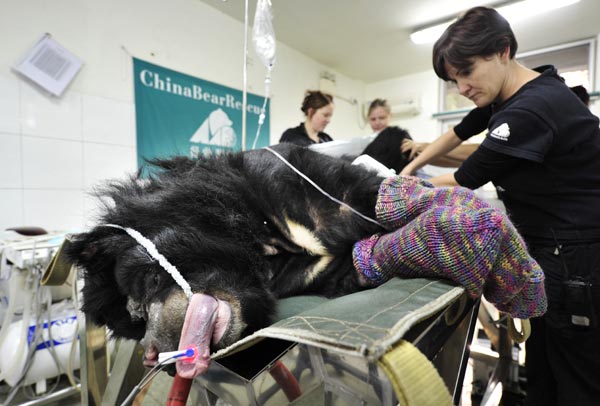Society
Bear activists object to company's IPO plan
By He Dan (China Daily)
Updated: 2011-02-16 07:15
 |
Large Medium Small |
 |
|
In this file photo taken on Dec 7, 2010, staff members give medical treatment to an injured black bear at a rescue center in Chengdu, Southwest China’s Sichuan province, which was co-founded by Animals Asia Foundation and the provincial forestry department in 2000. PROVIDED TO CHINA DAILY
|
"It sends a very hazardous message about our work to end bear farming, as the development of pharmaceutical companies selling products made from bear bile will lead to more bears being tortured," said Zhang Xiaohai, director of external affairs of Animals Asia Foundation's China Office, which is based in Hong Kong.
The foundation is quoted by AFP as saying the pharmaceutical company, Guizhentang, is hoping to raise 70 million yuan ($10.6 million) through a public listing to increase production of bear bile.
The group has appealed to the Fujian's securities regulator to block the listing, it said.
An official with the environment protection department in Fujian has confirmed that the Quanzhou-based Guizhentang had passed the environmental protection inspection in 2010 for issuing stocks, Beijing Youth Daily reported.
The company is still waiting for the final decision from the Fujian securities regulator, but the latter declined to reveal whether it has approved the application, according to the report of Shanghai-based National Business Daily.
The company, founded in 2000, could not be reached for comment on Tuesday.
But it said on its website that it farms 470 bears and hopes to increase the number to 1,200 following the listing.
Bear bile has been used in traditional Chinese medicine and in other Asian countries, as the ursodeoxycholic acid in bear bile is believed to have many benefits, such as improving eyesight, breaking down gallstones and protecting the liver.
However, the methods used to extract bear bile have been criticized as cruel and inhumane by animal welfare activists.
In the 1980s, captive breeding replaced the original method of killing wild black bears to get the bile.
One of the problems with bear farming is that bile bears usually suffer from varying degrees of mental stress and muscle atrophy after they have been kept in small cages for years, Zhang told China Daily.
Statistics from the State Forestry Administration show that the number of licensed bear farms has been reduced to 68, breeding about 7,000 bears nationwide by the end of 2006.
Moreover, in a bid to better regulate the industry, the government has not issued any new licenses to bear farms since 2006.
Zhang estimated there are currently about 10,000 bile bears in captivity.
Another pharmaceutical company that produces drugs using bear bile, Kaibao Pharma Co Ltd in Shanghai, was listed in early January 2010. The news was released on the company's website on Jan 8, 2010.
"Currently, there is no law in China to ban these kinds of companies issuing stocks as long as they get the bear bile from legal suppliers (registered bear farms)," said Chang Jiwen, a professor at the Institute of Law under the Chinese Academy of Social Sciences.
"We have seen the government make great efforts to gradually end this industry although this cannot be achieved in a short time," said Chang, who has been active in promoting legislation on animal welfare in China.
Research to find alternative herbs should be speeded up as both the government and the public have realized that it is important to achieve economic growth without harming animals, Chang stressed.
China Daily
(China Daily 02/16/2011 page5)
| 分享按鈕 |